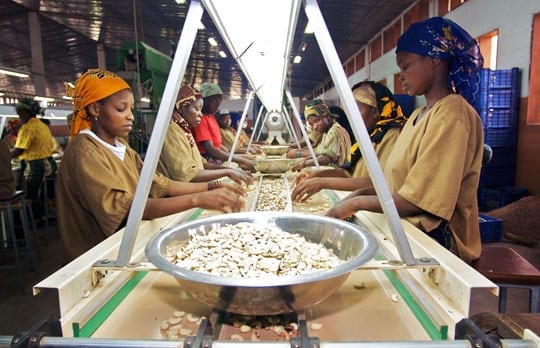After Two Years, ANDE Making an Impact for Small and Growing Businesses
A little over two years ago, the Aspen Network of Development Entrepreneurs (ANDE) formed to bring together organizations that focus on promoting entrepreneurship in developing countries.

The Aspen Network of Development Entrepreneurs (ANDE) was envisioned as a forum for these organizations to strengthen their skills, share best practices and enhance their impact. TechnoServe was a founding member, and I sit on ANDE’s executive committee. I have had a front-row seat to ANDE’s expansion and its growing recognition as an association of passionate, innovative and seasoned practitioners.
ANDE members focus on small and growing businesses (SGBs), those with 5 to 250 employees and strong potential and desire to grow. These companies are crucial to providing jobs, income opportunities and key products and services to poor communities. And yet SGBs are poorly represented in the developing world. In developed countries, SGBs contribute to more than half of gross domestic product and 57 percent of total employment; in the developing world, SGBs account for only 16 percent of GDP and 18 percent of total employment. Instead, microenterprises and large firms make up the majority of businesses in developing countries. SGBs often find themselves too large for microfinance but too small for bank loans. This state of affairs is known as “the missing middle.”
ANDE’s recent 2010 Impact Report demonstrates the increasing recognition of the importance of SGBs. In the first half of 2010, 22 investment funds launched with a primary focus on SGBs, according to the report. Private equity funds focused on emerging markets nearly doubled their targets for SGB investments from 2009 to 2010. The business owners themselves expressed increasing confidence about their ability to raise funding. The development community and investors alike are recognizing the potential of the SGB sector.
Nonetheless, while the middle may no longer be missing, it is still hard to find. The ANDE report details $10.5 billion raised from 2001 through the first half of 2010 for SGB investments. This pales in comparison to the nearly $300 billion raised for microfinance and larger deals. And this $10.5 billion still dwarfs the $80 million that ANDE members spent on capacity development – the on-the-ground work of training business owners, forging market linkages and providing consulting services. Capacity development is arguably the most critical element in helping SGBs thrive.
The ANDE report clearly presents the case for why supporting SGBs and continuing TechnoServe’s work in building this capacity is an important contribution to reducing poverty. “Even in well-developed capital markets, the majority of companies fail,” the report says. “The challenges faced by entrepreneurs in emerging markets are exponentially greater.” ANDE members help provide critical funding – $900 million collectively through more than 2,500 investments. They offer training, mentorship and consulting services to ensure the capital is employed productively. This is work that can make a real impact for both the business and its employees and suppliers. As an example, the ANDE report highlights TechnoServe’s work with the cashew industry in Mozambique. We helped entrepreneurs establish processing plants while also training farmers to produce higher-quality nuts. The program helped revive a dormant industry, set it on a path to self-sustaining growth and improve thousands of lives.
One of the most exciting things about ANDE is the way it fosters collaboration among its members through forums, trainings and initiatives. For example, ANDE’s Capacity Development Fund brings members together through various grants meant to spark innovation for the SGB sector as a whole. TechnoServe and Root Capital came together through one of these grants to develop a toolkit to train SGBs in basic financial management. The beginning and advanced levels of this training are being rolled out in sub-Saharan Africa and Latin America. Other grants have promoted mentorship, good corporate governance and leadership capacity within the SGB sector. These examples show how relatively small amounts of money can create behavior change.
Ultimately, the success and momentum of ANDE make clear the importance of training, investment and advocacy for SGBs in the developing world. Public donors, private philanthropists and impact investors should understand that developing the skills and capacities of the private sector will generate financial returns and create better lives. As SGBs continue to proliferate and thrive, we will see real, measurable progress toward ending poverty.



